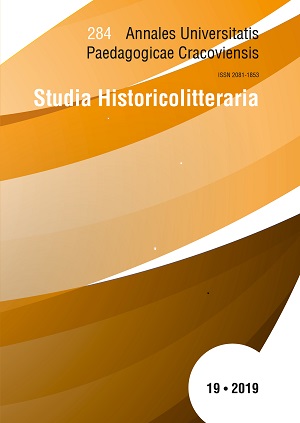„A tu rzeczywistość skrzeczy…”, czyli „Na marne” i „Z dobrego serca” Lucjana Rydla
Main Article Content
Аннотация
Two dramas by Lucjan Rydel 'Na marne' (1895) and 'Z dobrego serca' (1897) were created during the poet’s stay in Western Europe. These pieces are a testimony to changes in his worldview and attitude to life. He left in them his youthful fascination with symbolic and mood drama modeled on Maurice Maeterlinck’s plays. The attempts to transpose these patterns were heavily criticized by his youthful works 'Matka' and 'Dies irae'. Rydel turned to realism in art. In this case, the patterns were provided by Gerhart Hauptmann and Leo Tolstoy. Na marne is based on the confrontation of two life attitudes. The Major, a former insurgent, symbolizes patriotic tradition and deed, and his grandson Adam is a decadent who has lost faith in the meaning of life. It pushes him to suicide. This drama is a warning against passivity and fatalism. 'Z dobrego' serca treats about the sacrifice of a young girl who, after her sister’s death, decides to marry a much older brother-in-law to save her family. It becomes the personification of love of human being. For Rydel, the foundation on which we should build our life is Christian values. The choice made by the poet confirms his subsequent dramas mainly written for the folk theatre of which he was the initiator and creator.
Скачивания
Article Details

Это произведение доступно по лицензии Creative Commons «Attribution-NonCommercial-NoDerivatives» («Атрибуция — Некоммерческое использование — Без производных произведений») 4.0 Всемирная.
ПОЛИТИКА АВТОРСКИХ ПРАВ
Издатель «Annales Universitatis Paedagogicae Cracoviensis. Studia Historicolitteraria» имеет право использования и распространения всех опубликованных в издании материалов на основании договора неограниченной во времени неисключительной лицензии - предварительно заключенного на неоговоренное время с каждым автором конкретного произведения на оговоренных в том договоре условиях использования.
ПОЛИТИКА ОТКРЫТОГО ДОСТУПА
«Annales Universitatis Paedagogicae Cracoviensis. Studia Historicolitteraria» это издание с открытым доступом, а все его содержание доступно бесплатно для пользователей и организаций на основаниях неисключительной лицензии CreativeCommons (CC BY-NC-ND 4.0). Пользователи могут читать, скачивать, копировать, распространять, производить поиск или переходить по ссылкам к полным текстам статей в этом издании без предварительного согласия издателя либо автора при условии указания источника доступа и авторства данной публикации. Это согласуется с определением открытого доступа BOAI (http://www.soros.org/openaccess).
Библиографические ссылки
Brzozowska T., Lucjan Rydel. 1870–1918, [w:] Obraz literatury polskiej XIX i XX wieku, seria V: Literatura okresu Młodej Polski, red. K. Wyka, A. Hutnikiewicz i M. Puchalska, t. 2, Warszawa 1967, s. 197–207.
Dużyk J., Droga do Bronowic. Opowieść o Lucjanie Rydlu, wyd. 2 poprawione i uzupełnione, Warszawa 1972.
Jankowski E., Rydel: poeta „zaśmieszony”, „Przegląd Humanistyczny” 1959, nr 3/2, s. 133–139.
Leśniakiewicz I., Co zostało z Rydla, „Tygodnik Powszechny” 1968, nr 27, s. 4.
Listy L. Rydla do K.M. Górskiego, oprac. J. Dużyk, „Pamiętnik Literacki” 1971, z. 1, s. 171–227.
Listy Stanisława Wyspiańskiego do Lucjana Rydla, cz. 1: Listy i Notatnik z podróży, oprac. L. Płoszowski i M. Rydlowa, Kraków 1979.
Matuszek G., Dramaty naturalistyczne, Kraków 2001.
Olszewska M.J., Głos Lucjana Rydla w sporach o teatr ludowy. („Teatr wiejski przyszłości”, „Betlejem polskie”), [w:]
Młoda Polska w najnowszych badaniach, red. E. Jakiel i T. Linker, Gdańsk 2016, s. 87–118.
Olszewska M.J., Jeńcy – poetycka wizja historii według Lucjana Rydla, [w:] Wokół dramatu poetyckiego, t. 1, red. M. Gabryś-Sławińska i G. Głąb, Lublin 2017, s. 125–150.
Rydel L., Utwory dramatyczne, t. 1, Kraków 1902.
Tatarowski L., Wstęp, [do:] L. Rydel, Wybór dramatów, oprac. L. Tatarowski, BN, seria I, nr 247, Wrocław – Warszawa – Kraków – Gdańsk – Łódź 1983, s. III–CVI.
